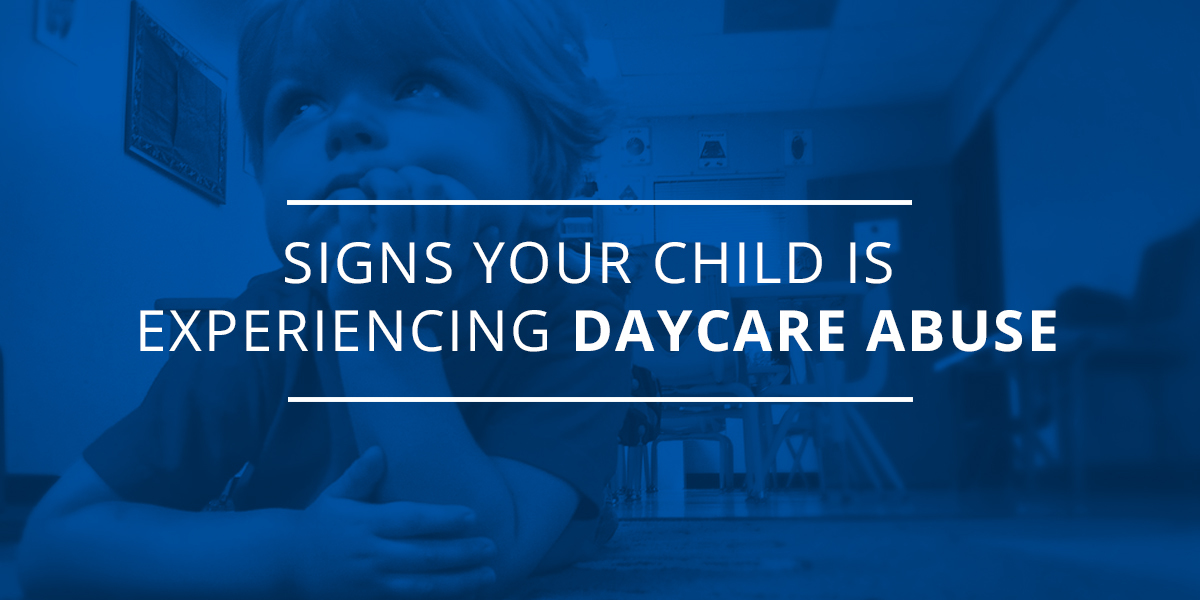Signs Your Child Is Experiencing Daycare Abuse

Is there anything more anxiety-inducing for a parent than dropping their child off at daycare for the first time?
Daycares provide an invaluable service to many families whose primary caregivers have to work long hours to support their young families. However, media reports have drawn attention to horrible incidents where children are being abused by their childcare providers.
Physical and sexual abuse can have long term, detrimental effects on children. Abuse can take many forms, the most common forms being sexual, physical, emotional and neglect.
Sexual Abuse
This includes any form of inappropriate or unwanted sexual activity with a minor. Abusers may manipulate their vulnerable or trusting victims using several tactics. The most common tactic is to convince the victim that the sexual acts are normal. Abusers try to convince the child that the activities are a secret that must be kept between the child and the abuser.
Sexual abuse does not necessarily have to be sexual intercourse but may include:
- Fondling
- Penetrative sex
- Obscene phone calls or texts
- Production of pornographic content involving children
- Masturbation in the presence of the child
- Exhibitionism
Physical Abuse
Physical abuse is the non-accidental injury resulting from hitting, whipping, beating, biting, kicking, or anything that physically harms a child’s body. Sometimes the signs of physical abuse may be noticeable. But not always!
Parents of physically abused children must be vigilant about any strange scars or injuries that a child may have. Parents must be alert to any change in behavioral patterns of a child such as aggression of a child towards other children, pets or inanimate objects.
Emotional Abuse
Psychological and emotional abuse occurs when an abuser’s behavior negatively affects a child’s mental, psychological or emotional wellbeing. This form of abuse affects a child’s emotional development. Emotional abuse is falsely perceived to be a lesser form of abuse compared to physical and sexual abuse.
For this reason, many victims and survivors of emotional abuse may live for many years before realising that they had been abused in their childhood. Some traits of a victim of emotional abuse may develop attachment issues, anxiety attacks, speech disorders or poor emotional intelligence.
Emotional abuse can include:
- Unfairly making a child feel guilty or responsible for something they naturally have no control over such as a divorce, or something minor.
- Withholding love and affection from a child
- Threatening a child
- Teasing
- Constant and unproportioned criticism of a child
Neglect
Neglect is an action or inaction of a caregiver that results in the physical or emotional harm of a child. Neglect can be the result of an understaffed daycare or insufficiently trained staff who may not know how to ensure that your child always receives their basic needs.
Neglect can include:
- Failure to ensure a child has a seatbelt on
- Leaving a child unsupervised in a hazardous or potentially hazardous environment
- Withholding of food or warm clothing
- Leaving a child exposed to poorly stored drugs or alcohol
- Abandonment
Signs to Look For
So what signs do you look for?
- Behavioural changes: As we have described above, child abuse can lead to psychological and emotional changes in a child. So, pay attention to any dramatic shift in your child’s personality after attending daycare or a baby sitter.
- Is your child hungry or thirsty? If your loved one is constantly thirsty or hungry when you pick them up from daycare it may be a sign that their care providers forgot to provide them with water, meals or snacks. This kind of inattention may be signs of bigger problems.
- Nightmares: If your child starts experiencing nightmares after attending daycare it may be a sign that they are re-experiencing traumatic experiences from their time in care.
- Regression: Has your child suddenly regressed to behaviours they had outgrown like bedwetting, thumb sucking, or fear of darkness or being alone?
- Repeated diaper rash: If your baby starts having repeated diaper rashes it may be a sign that the care provider has been leaving the child in soiled diapers.
- Precocious or overt sexual behaviour: Children who start acting out in a sexual manner, or showing an understanding of sex beyond their age may have been exposed to inappropriate sexual contact.
Get Legal Help Immediately
Silence protects the abusers. Childhood abuse almost always results in long term psychological, emotional and physical damage and can cause long term problems in a child’s future relationships. If you suspect that your child is experiencing physical abuse, sexual abuse, emotional abuse or neglect you are not alone.
At McKiggan Hebert we have earned national recognition for acting on behalf of victims of abuse. We understand the sensitivity of abuse and the unique needs associated with it. Order your free copy of our Survivor’s Guide to Abuse Claims before hiring another lawyer. Get in touch with our experienced lawyers at McKiggan Hebert by calling 902-423-2050 or email us by filling out our contact form.

